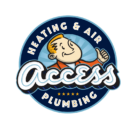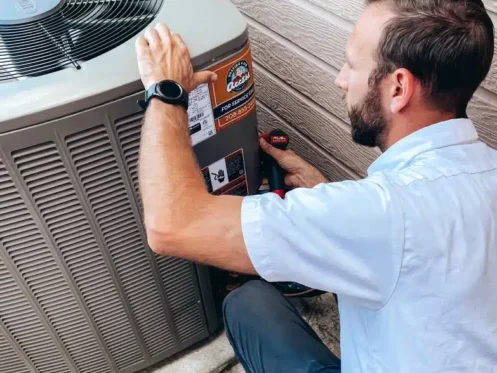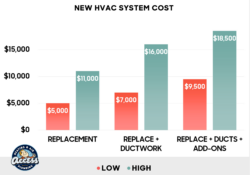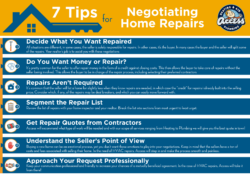Buying a new home is an exciting milestone, filled with dreams of fresh paint, personalized decor, and creating lasting memories. Amidst all the excitement, it’s easy to overlook one of the most crucial systems in your new abode: the Heating, Ventilation, and Air Conditioning (HVAC) system. Your HVAC system is the unsung hero that keeps your home comfortable year-round, regulating temperature, humidity, and even indoor air quality.
For new homebuyers in Boise, Idaho, and beyond, understanding your HVAC system isn’t just about avoiding a surprise repair bill; it’s about ensuring your family’s comfort, health, and energy efficiency for years to come. At Access Heating Air and Plumbing, we’ve been serving the Treasure Valley for over 50 years, and we know firsthand the questions and concerns new homeowners have.
This comprehensive guide will walk you through everything you need to know about HVAC as a new homebuyer, from what to look for during a showing to essential maintenance tips that will save you money and headaches down the road. Let’s dive in and empower you with the knowledge to make informed decisions about your home’s comfort system.
Before You Buy: HVAC Considerations During the Home Search
The thrill of finding your dream home can sometimes overshadow the practicalities. When you’re touring properties, it’s vital to pay attention to the HVAC system, as it can significantly impact your future comfort and expenses.
1. Age and Condition of the System
One of the first things to ascertain is the age of the HVAC system. Like any appliance, HVAC units have a lifespan.
- Furnaces typically last 15-20 years.
- Air conditioners generally have a lifespan of 10-15 years.
- Heat pumps can last 10-15 years as well, sometimes longer with proper maintenance.
An older system might still be functioning, but it could be nearing the end of its life, meaning a costly replacement could be on the horizon shortly after you move in.
Red Flags to Look For:
- Original or visibly old units: Look for manufacturing dates on the units themselves.
- Excessive rust, dents, or cracks: These can indicate neglect or damage.
- Water stains around the indoor or outdoor units: This could signal leaks.
- Heavy dust buildup: Suggests poor maintenance.
Questions to Ask the Seller/Agent:
- “What is the exact age of the furnace and air conditioner/heat pump?”
- “Can you provide any records of past HVAC maintenance or repairs?”
- “When was the last time the system was professionally serviced?”
2. System Type and Energy Efficiency
Not all HVAC systems are created equal, especially when it comes to energy efficiency. Understanding the type of system installed and its efficiency ratings can give you a clear picture of potential utility costs.
Common HVAC System Types:
- Furnace and Air Conditioner (Split System): This is a very common setup, with a furnace for heating (often natural gas or electric) and a separate outdoor air conditioner for cooling.
- Heat Pump: A heat pump provides both heating and cooling in one unit by transferring heat. In cooler months, it extracts heat from the outside air and transfers it inside, and in warmer months, it pulls heat from inside your home and expels it outdoors. Heat pumps are generally more energy-efficient than traditional furnaces and ACs, especially in milder climates like Boise’s. They run on electricity, which can be a plus for those looking to reduce their carbon footprint or incorporate solar energy.
- Ducted Heat Pumps: Connect to your home’s central air duct system, similar to a furnace/AC.
- Ductless Mini-Splits: Ideal for homes without existing ductwork, additions, or for zone heating/cooling. Each indoor unit operates independently, allowing for different temperatures in different rooms.
- Dual Fuel Systems: These combine a heat pump with a gas furnace. The heat pump handles most of the heating and cooling, while the gas furnace kicks in during very cold temperatures when the heat pump’s efficiency drops.
Key Energy Efficiency Ratings:
- SEER (Seasonal Energy Efficiency Ratio): For air conditioners and heat pumps, a higher SEER rating indicates greater efficiency. Current minimum SEER for new AC units is 14 SEER in the North (Boise is in the North region) and 15 SEER in the Southeast/Southwest.
- AFUE (Annual Fuel Utilization Efficiency): For furnaces, AFUE measures how efficiently a furnace converts fuel into usable heat. A higher AFUE percentage means more of the fuel is converted to heat and less is wasted. Modern furnaces often have AFUE ratings of 80% or higher, with some high-efficiency models reaching 90-98%.
- HSPF (Heating Seasonal Performance Factor): For heat pumps, HSPF measures heating efficiency. A higher HSPF means more efficient heating.
Questions to Ask:
- “What type of HVAC system is installed (furnace/AC, heat pump, dual fuel)?”
- “What are the SEER, AFUE, and/or HSPF ratings of the units?”
- “What are the average monthly heating and cooling costs for this home?” (This can give you an immediate idea of efficiency and potential costs.)
3. Proper Sizing for the Home
An HVAC system that is too small will struggle to heat or cool your home effectively, leading to overworked equipment, discomfort, and higher energy bills. Conversely, an oversized system will cycle on and off too frequently (short-cycling), leading to uneven temperatures, increased wear and tear, and poor humidity control.
Signs of Improper Sizing:
- Rooms that are consistently hotter or colder than others.
- The system running constantly or very frequently, especially on moderate days.
- Excessive humidity in the home during cooling season.
What to Do: During your home inspection (more on this below), ask the inspector or an HVAC professional to assess if the system is properly sized for the home’s square footage, insulation, window types, and orientation to the sun. This is a complex calculation best left to experts.
4. Ductwork Condition
The ductwork is the circulatory system of your HVAC. Even a brand-new, highly efficient HVAC unit won’t perform optimally if the ducts are leaky, improperly sized, or full of debris.
Signs of Ductwork Issues:
- Visible gaps or tears in the ductwork.
- Dust streaks around vents.
- Uneven airflow from different vents.
- Musty or stale odors when the system runs.
- Excessive noise when the system is operating (can indicate undersized ducts or leaks).
Questions to Ask/Check:
- “When was the ductwork last inspected or cleaned?”
- During a walk-through, feel for airflow from all vents. Is it consistent?
- Look inside vents for dust buildup or signs of mold.
The Home Inspection: Your HVAC Deep Dive and What Could Cost You Thousands
The home inspection is your golden opportunity to get a professional assessment of the HVAC system. Don’t skip this crucial step! A qualified home inspector will examine the HVAC components, but it’s often wise to have a dedicated HVAC technician perform a separate, more in-depth inspection if you have specific concerns or if the home is older.
Key Areas an Inspector Will Check:
- Thermostat Functionality: Ensures it’s correctly wired and controlling the system.
- Filter Condition: A dirty filter is a red flag for neglected maintenance.
- Furnace/Air Handler: Checks for proper operation, signs of rust, leaks, or unusual noises. For gas furnaces, they’ll check for gas leaks and proper ventilation.
- Outdoor Unit (AC/Heat Pump Condenser): Inspects the coils for cleanliness, refrigerant lines for leaks, and overall condition.
- Ductwork: Looks for leaks, proper sealing, and insulation.
- Refrigerant Levels: Critical for AC and heat pump efficiency. Low levels indicate a leak.
- Drain Lines: Checks for blockages or leaks in the condensate drain.
- Safety Controls: Ensures all safety mechanisms are functioning correctly (e.g., limit switches, flame sensors).
Major HVAC Issues That Can Cost Thousands (and How to Approach Them):
Here are some critical HVAC issues that, if unchecked before purchase, could lead to significant financial burdens:
- Old or Failing System Components:
- The Cost: Replacing an entire HVAC system (furnace and AC or heat pump) in Boise can range from $8,000 to $15,000+ depending on the size, efficiency, and type of system (e.g., dual fuel systems or high-efficiency units are at the higher end). A new furnace alone typically costs $5,000 to $10,000, while a new AC unit can range from $4,000 to $8,000 for central AC.
- What to Look For: An HVAC system nearing or exceeding its expected lifespan (15-20 years for furnaces, 10-15 years for ACs/heat pumps) is a major red flag. Look for rust, visible damage, or outdated technology (e.g., older refrigerant types like R-22, which is being phased out and is more expensive to recharge).
- How to Approach the Seller/Agent: If the system is old, especially if it’s already showing signs of wear or has had recent major repairs, request a credit at closing or a price reduction that covers a significant portion, if not all, of a new system’s cost. Provide estimates from reputable local HVAC companies (like Access Heating Air and Plumbing) to justify your request. Frame it as a necessary capital improvement the house will need soon. Your real estate agent will help you draft a repair addendum or request for concession.
- Refrigerant Leaks:
- The Cost: Repairing a refrigerant leak can range from $200 to $1,500, depending on the leak’s location and severity. However, if the leak is extensive, or if the system uses R-22 refrigerant (which is very expensive due to its phase-out), a full replacement of the AC or heat pump may be the only viable solution, leading to the $4,000 to $15,000+ replacement cost mentioned above. Repeated recharges without fixing a leak are a waste of money and indicate a bigger problem.
- What to Look For: Your home inspector should check refrigerant levels. Signs of a leak can include ice buildup on the outdoor unit’s coils or copper lines, weak cooling, or a hissing sound.
- How to Approach the Seller/Agent: If a refrigerant leak is detected, insist on a professional HVAC repair before closing. Request that the repair be performed by a licensed technician and that all necessary permits are pulled. If the system is old and uses R-22, you might argue that a repair is a temporary fix and push for a credit towards a new, R-410A compliant system.
- Compromised Ductwork (Leaks, Mold, or Improper Sizing):
- The Cost: Repairing ductwork leaks can range from $200 to $1,000 for minor issues, but extensive sealing or replacing sections could cost $1,000 to $3,000. If mold is present, professional mold remediation for ductwork can be $2,000 to $6,000. Full duct replacement can cost $3,000 to $6,000 or more for larger homes or complex layouts.
- What to Look For: Uneven temperatures, high energy bills, excessive dust, musty smells when the system runs, or visible gaps/tears in exposed ductwork. Mold is a serious health hazard.
- How to Approach the Seller/Agent: For significant ductwork issues, especially mold, request professional remediation and sealing/repair by a qualified HVAC company. Provide detailed estimates. Highlight the health risks associated with mold. If the ductwork is extensively damaged or improperly sized, advocate for a credit towards a full replacement.
- Failed Blower Motor:
- The Cost: Replacing a blower motor can cost anywhere from $400 to $2,000, depending on the type of motor (single-speed, multi-speed, variable-speed) and accessibility.
- What to Look For: Weak airflow from vents, the system turning on but no air coming out, or loud screeching/grinding noises when the furnace or air handler is running.
- How to Approach the Seller/Agent: Request that the seller cover the cost of a professional blower motor replacement. This is usually a straightforward repair, and providing a quote from a local HVAC company will make your case strong.
- Corrosion or Damage to Compressor/Coils:
- The Cost: If the compressor (the “heart” of your AC or heat pump) fails, it’s often more cost-effective to replace the entire outdoor unit than just the compressor, which alone could be $1,500 to $3,000+ for parts and labor. Severely corroded or damaged evaporator/condenser coils could also necessitate unit replacement, leading to the $4,000 to $15,000+ range.
- What to Look For: Visible corrosion on the outdoor unit’s coils, odd noises from the outdoor unit, or a complete lack of cooling.
- How to Approach the Seller/Agent: This is a major repair. If the inspector identifies significant corrosion or a failing compressor, you should strongly push for a credit or replacement of the outdoor unit, as this is a very expensive component.
Negotiating with the Seller and Your Real Estate Agent:
- Prioritize: Work with your real estate agent to identify the most critical HVAC issues that are genuinely safety concerns or will lead to significant immediate costs. Don’t ask for every minor cosmetic flaw.
- Get Quotes: Always obtain written estimates from licensed HVAC professionals (like Access Heating Air and Plumbing) for any significant repairs or replacements you are requesting. This gives your request credibility.
- Be Realistic: Understand the current market conditions. In a hot seller’s market, sellers may be less willing to negotiate on anything but major safety issues. In a buyer’s market, you’ll have more leverage. Your agent will advise you on the best strategy.
- Options for Resolution: You generally have a few options for negotiating:
- Seller Pays for Repairs: The seller contracts and pays for the repairs before closing. Ensure you get documentation and potentially a warranty for the work.
- Credit at Closing: The seller provides a credit to you at closing for the estimated cost of repairs. This gives you control over who does the work and when.
- Price Reduction: The seller reduces the overall purchase price of the home. This is often preferred if you plan to do significant upgrades or if the repairs are extensive.
- Home Warranty: The seller might offer to purchase a home warranty (typically for one year) that covers major systems and appliances, including HVAC, for a set period after closing. This can provide some peace of mind for unexpected breakdowns.
- Collaborate with Your Agent: Your real estate agent is your advocate. They will communicate your requests to the seller’s agent and guide you through the negotiation process, ensuring your interests are protected. They have experience in framing these requests effectively.
Essential Questions to Ask Your Home Inspector (or HVAC Professional):
- “Are there any immediate repairs needed for the HVAC system that could pose a safety risk or lead to a major breakdown?”
- “What is the estimated remaining lifespan of the furnace and AC/heat pump?”
- “Is the system properly sized for this home?”
- “Are there any signs of inadequate maintenance or neglect that could lead to future expensive issues?”
- “Are the energy efficiency ratings (SEER, AFUE, HSPF) appropriate for a home of this size and age, and will they lead to high utility bills?”
- “Are there any suggestions for upgrades or improvements to enhance efficiency or indoor air quality, and what are their estimated costs?”
- “Are there any safety concerns, such as gas leaks, electrical hazards, or carbon monoxide concerns?”
If the inspection reveals significant issues, you’ll have leverage to negotiate repairs, a price reduction, or ask for a home warranty to cover potential future problems.
After You Buy: Essential HVAC Tips for New Homeowners
Congratulations, you’ve moved in! Now the real work (and savings) begin. Taking proactive steps to maintain your HVAC system will extend its life, improve efficiency, and ensure consistent comfort.
1. Change Your Air Filters Regularly
This is arguably the simplest and most impactful HVAC maintenance task you can perform. A clogged filter restricts airflow, forcing your system to work harder, increasing energy consumption, and potentially leading to premature breakdown.
- Frequency: Check your filter monthly and replace it every 1-3 months, depending on your filter type, presence of pets, allergies, and overall dust levels in your home.
- Filter Type: Understand the MERV (Minimum Efficiency Reporting Value) rating of your filter. Higher MERV ratings capture more particles but can restrict airflow if your system isn’t designed for them. Consult with Access Heating Air and Plumbing to determine the best MERV rating for your system.
2. Clear Around Your Outdoor Unit
Your outdoor AC or heat pump unit (condenser) needs adequate airflow to operate efficiently.
- Keep it Clear: Regularly clear away leaves, grass clippings, dirt, and debris from around the unit.
- Maintain Clearance: Ensure there’s at least 2-3 feet of clearance around the outdoor unit for proper airflow. Trim back any bushes or foliage.
3. Check Your Thermostat Settings
Familiarize yourself with your thermostat. If you have a programmable or smart thermostat, take advantage of its features to optimize energy savings.
- Programmable Thermostats: Set schedules to reduce heating/cooling when you’re away or asleep.
- Smart Thermostats: These Wi-Fi enabled devices offer advanced features like:
- Remote Control: Adjust temperatures from your smartphone, even when you’re not home.
- Learning Capabilities: Some smart thermostats learn your temperature preferences and adjust automatically.
- Geofencing: Uses your phone’s location to know when you’re leaving or returning, adjusting the temperature accordingly.
- Energy Tracking: Provides insights into your energy usage, helping you identify areas for savings.
- Boise residents often qualify for rebates on ENERGY STAR certified smart thermostats!
4. Keep Vents and Registers Clear
Ensure that all supply and return vents inside your home are unobstructed.
- No Blockages: Don’t place furniture, rugs, or drapes over vents, as this restricts airflow and creates pressure imbalances in your ductwork, which can damage your system.
- Don’t Close Vents in Unused Rooms: While it seems logical to close vents in unused rooms to save energy, this can actually make your system work harder and cause inefficiencies due to pressure imbalances.
5. Test Your System Before Each Season
Don’t wait for extreme temperatures to find out your system isn’t working.
- Before Summer: Turn on your air conditioning in late spring to ensure it’s cooling properly.
- Before Winter: Fire up your furnace in early fall to confirm it’s heating effectively.
- Listen and Observe: Pay attention to any unusual noises, odors, or a lack of consistent heating/cooling.
6. Understand Your Warranty
If your new home came with a relatively new HVAC system, there might be a manufacturer’s warranty still in effect.
- Transferability: Check if the warranty is transferable to new homeowners.
- Coverage: Understand what parts and labor are covered, and for how long.
- Voiding the Warranty: Be aware of actions that can void your warranty, such as improper maintenance or unauthorized repairs.
7. Schedule Annual Professional Tune-Ups
This is perhaps the most important tip for extending the life and efficiency of your HVAC system. Just like your car, your HVAC system needs regular professional attention.
- Annual Maintenance: Schedule a professional tune-up for your furnace in the fall and your air conditioner in the spring. If you have a heat pump, one tune-up annually is typically sufficient, as it handles both heating and cooling.
- Benefits of Tune-Ups:
- Improved Efficiency: Technicians clean components, lubricate moving parts, and make minor adjustments to ensure peak performance, leading to lower energy bills.
- Early Problem Detection: Catching small issues before they become major breakdowns saves you money on costly repairs.
- Extended Lifespan: Regular maintenance helps your system last longer.
- Enhanced Safety: For gas furnaces, tune-ups ensure safe operation and check for carbon monoxide leaks.
- Maintain Warranty: Many manufacturer warranties require annual professional maintenance.
Access Heating Air and Plumbing’s All-Access Membership
At Access Heating Air and Plumbing, we offer comprehensive maintenance plans, like our All-Access Membership, designed to give new homeowners peace of mind. Our skilled technicians will perform thorough inspections, cleanings, and adjustments, ensuring your system runs optimally year-round. Joining a maintenance plan can save you money on repairs, extend your system’s life, and provide priority service.
When to Call a Professional: Beyond Basic Maintenance
While changing filters and clearing debris are great DIY tasks, some issues require the expertise of a certified HVAC technician. Don’t hesitate to call Access Heating Air and Plumbing if you notice any of the following:
- Unusual Noises: Grinding, squealing, banging, or persistent rattling could indicate a serious problem.
- Strange Odors: A burning smell, musty odors, or a “rotten egg” smell (for gas leaks) are all causes for immediate concern.
- Lack of Heating or Cooling: If your system isn’t producing conditioned air, or the airflow is weak.
- Frequent Cycling: The system turning on and off too often could indicate a sizing issue or another problem.
- Spikes in Energy Bills: If your utility costs suddenly increase without a change in usage, your HVAC system might be losing efficiency.
- Uneven Temperatures: Significant temperature differences between rooms even after ensuring vents are open.
- Water Leaks: Puddles or drips around your indoor or outdoor units.
- Thermostat Malfunctions: If your thermostat isn’t accurately reading the temperature or controlling the system.
Investing in Your Home’s Future: Upgrades and Replacements
Even with diligent maintenance, your HVAC system will eventually need to be replaced. When that time comes, consider modern, energy-efficient options that can significantly reduce your operating costs and improve your home’s comfort and value.
Considerations for Upgrades/Replacements:
- High-Efficiency Systems: Invest in units with higher SEER, AFUE, or HSPF ratings for long-term energy savings.
- Smart Thermostats: An excellent investment for control, convenience, and energy management.
- Improved Indoor Air Quality (IAQ): As new homeowners, you’re creating a fresh environment. Consider adding:
- Air Purifiers: To remove allergens, dust, pet dander, and other airborne contaminants.
- Humidifiers/Dehumidifiers: To maintain optimal humidity levels for comfort and health.
- UV Lamps: To kill mold, bacteria, and viruses in your ductwork.
- Duct Sealing and Insulation: Addressing leaky or uninsulated ductwork can dramatically improve efficiency and comfort.
- Zone Control Systems: For larger homes or homes with varying heating/cooling needs, zone control allows you to heat or cool specific areas independently, saving energy and increasing comfort.
Why Choose Access Heating Air and Plumbing for Your HVAC Needs in Boise?
For new homeowners in Boise, choosing a trustworthy HVAC partner is crucial. Access Heating Air and Plumbing has been the Treasure Valley’s premier HVAC and plumbing company since 1972. We’re committed to providing:
- Experienced Professionals: Our skilled technicians have nearly half a century of combined experience, ensuring high-quality installations, repairs, and maintenance.
- Comprehensive Services: From routine tune-ups and emergency repairs to full system replacements and indoor air quality solutions, we’re your one-stop shop for all things HVAC.
- Customer Satisfaction Guaranteed: We prioritize quality, reliability, and affordability, and we stand behind our work.
- Local Expertise: We understand the unique heating and cooling challenges and opportunities in the Boise climate.
- Transparent Pricing: We offer fair prices and detailed explanations of all services.
Your new home is a significant investment, and its HVAC system plays a vital role in your comfort and well-being. By being proactive, asking the right questions, and partnering with a reputable local HVAC company like Access Heating Air and Plumbing, you can ensure your home remains a comfortable haven for years to come.
Don’t let HVAC concerns overshadow the joy of homeownership. Contact Access Heating Air and Plumbing today for a consultation, professional inspection, or to learn more about our All-Access Membership. We’re here to help you enjoy your new home, worry-free!




